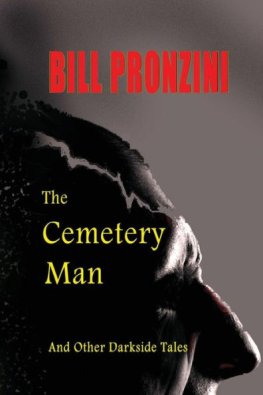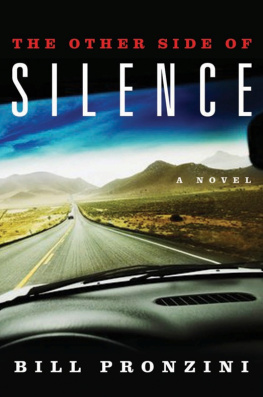Bill Pronzini - Beyond the Grave
Here you can read online Bill Pronzini - Beyond the Grave full text of the book (entire story) in english for free. Download pdf and epub, get meaning, cover and reviews about this ebook. year: 2011, publisher: Speaking volumes, genre: Detective and thriller. Description of the work, (preface) as well as reviews are available. Best literature library LitArk.com created for fans of good reading and offers a wide selection of genres:
Romance novel
Science fiction
Adventure
Detective
Science
History
Home and family
Prose
Art
Politics
Computer
Non-fiction
Religion
Business
Children
Humor
Choose a favorite category and find really read worthwhile books. Enjoy immersion in the world of imagination, feel the emotions of the characters or learn something new for yourself, make an fascinating discovery.

- Book:Beyond the Grave
- Author:
- Publisher:Speaking volumes
- Genre:
- Year:2011
- ISBN:9781612321202
- Rating:3 / 5
- Favourites:Add to favourites
- Your mark:
- 60
- 1
- 2
- 3
- 4
- 5
Beyond the Grave: summary, description and annotation
We offer to read an annotation, description, summary or preface (depends on what the author of the book "Beyond the Grave" wrote himself). If you haven't found the necessary information about the book — write in the comments, we will try to find it.
Beyond the Grave — read online for free the complete book (whole text) full work
Below is the text of the book, divided by pages. System saving the place of the last page read, allows you to conveniently read the book "Beyond the Grave" online for free, without having to search again every time where you left off. Put a bookmark, and you can go to the page where you finished reading at any time.
Font size:
Interval:
Bookmark:
Bill Pronzini, Marcia Muller
Beyond the Grave
PROLOGUE
1846
From where he stood on the casa's upper gallery, Don Esteban Velasquez commanded a broad view of all that was his. As far as the eye could see were the hills and valleys, creeks, groves of oaks and fruit trees that comprised Rancho Rinconada de los Robles, his grant from the government of Mexico. Below this oak-shaded hill where he had built his hacienda, nestled in one of the little valleys near the westward roadway, stood the adobe buildings of the rancho's pueblo; the cross atop the church of San Anselmo de las Lomas, rising above the stables and garrison and vaqueros' quarters, was like a brand burned in the gray sky by the hand of God. Down there, too, to the rear of the church, was the cemetery where Don Esteban's first wife, Maria Alcazar, and two of his three sons lay at rest beneath the grassy sod.
But it was at none of these things that he stood looking on this drizzly December morning, three days before Christmas. It was at the rider approaching on the main camino from the south-a single rider forcing his horse at a gallop along the muddy track, where instead there should have been a long column of men and animals returning without undue haste, in triumph.
The rider was still too far away for Don Esteban to recognize his clothing or his mount. One of the rancho's soldados? His mayordomo, Jose Verdugo? No matter. It did not matter. Whoever the rider was, he could only be carrying a message of doom from San Marcos Pass: Don Esteban's plan had failed.
He knew this with a bleak certainty; there could be no other explanation for the lone rider, the thunderous haste. He had known it the moment one of his mestizo servants, having noticed the rider's approach, had summoned him. He had already ordered the servants here to prepare to defend the hacienda. He had already sent word to the remaining few of his men at the pueblo to do likewise there, and to begin evacuating the women and children; and he had requested that Padre Urbano join him immediately.
He had given no thought to escape. This land was his; he had lived here for twenty-five years, and three members of his family were buried here. If he had not been prepared to die defending it, he would not have devised and then sought to carry out his intrigue against the Americano troops. He would, instead, have accompanied his young wife, Gloria, and his only living son, the child Felipe, to Mexico City ten months ago, when it had become clear to him, if not to all the other abajenos, that war between Mexico and Los Estados Unidos was imminent.
What fools those others were! They had shut their minds as well as their eyes to the Americanos' desire for the annexation of California. Refused to listen when Don Esteban urged that a well-trained militia be assembled and garrisoned at strategic points throughout the province, rather than relying on the private soldados loyal to each don. Refused to listen when he had spoken out in favor of expelling all gringos, not just the troublemakers such as John Fremont. And now it was too late. Now war had been declared. Now the Yanquis had captured General Vallejo at Sonoma and raised a flag, what they called the Bear Flag, proclaiming California a republic. Now Monterey, the provincial capital, had fallen, as had most of the northern half of the province. It was a time for desperate measures if the abajenos were to save the southern half.
If the trap at San Marcos Pass had been properly sprung, it would have dealt the advancing Yanqui forces a crippling blow. And by all the saints, it should have been properly sprung. Spies had reported the movement of Fremont's batallion on El Camino Real, pointing south for an assault on Santa Barbara. This route, the easiest, would take them through Refugio Pass. But Don Esteban had spread word of an ambush at Gaviota Pass, beyond Refugio: soldados from the Santa Barbara garrison waiting to roll boulders down on the Americanos as they passed through the narrows. Fremont, believing this falsehood, had diverted his troops away from Refugio to the more rugged route-a brush-grown Indian trail-through San Marcos Pass. It was at San Marcos that the real ambush had been laid, manned by men from Rancho Rinconada de los Robles. Why it had failed to catch the gringos by surprise Don Esteban would soon know.
When the lone rider neared the foot of the hill below, Don Esteban descended from the gallery by way of the courtyard stairs and crossed to the main gate. He said nothing to the three armed guards who waited there in the thin drizzle, watching as he had been watching from above. There was nothing more to be said until the messenger reached them.
But the messenger did not reach them. Halfway up the hill, the plunging horse broke stride, stumbled, pitched the rider as it fell heavily on its side in the thick adobe mud. The animal, so sweat-lathered that its brown coat seemed smeared with white, lay spasming for a few seconds and then was still. The man staggered to his feet, holding his head, swaying with fatigue; Don Esteban, waiting at the gate while the mestizos ran downhill, recognized the wet, strained features of Jose Verdugo.
The mestizos half carried the mayordomo uphill into the courtyard and laid him down beneath the protective overhang of the gallery. Water was brought for him, and when he could speak, the tale he told was this:
The trap had been laid as ordered on the hillside above the San Marcos trail. But it was the men of Don Esteban, not the Americanos, who had been the victims of a surprise attack. Scouts had reported Fremont's batallion encamped for the night along Alamo Pintado Creek, in a canyon below the pass; but Fremont had somehow learned of the ambush-from the lips of a traitor, no doubt-and had sent a detachment of perhaps fifty soldados on a circuitous route that took them to a position above and behind Don Esteban's forces. A dozen loyalists were killed in the first surprise volley; the rest were routed, run down, and shot or captured. Verdugo had barely managed to escape with his life. He had hidden in a cave until nightfall and then rounded up a horse and raced back here to the hacienda.
Listening to the mayordomo's account, Don Esteban knew that if a traitor had revealed the ambush plan to Fremont, that man would also have revealed the identity of the one who had arranged it. The Yanqui major would not allow such an act to pass unpunished. He would dispatch, if he had not already done so, another detachment of troops to arrest Don Esteban, and, if necessary, to lay siege to Rancho Rinconada de los Robles. It was the way of war; Don Esteban would have done the same if their positions were reversed. The soldados might arrive today, though it was unlikely they would have ridden all night as Verdugo had done; and if they reached the rancho late in the day, it was also unlikely that they would risk a night skirmish on unfamiliar terrain. Tomorrow, then. Don Esteban and the last of his loyalists would have perhaps twenty-four hours to prepare for the assault.
Men and weapons were too few to mount an adequate defense; he knew this. The Americanos would eventually claim a victory. But he would not be alive to see the fall of his rancho. Death was not only preferable, it was to be welcomed. He had no fear of it. His only fear, now, was that his most treasured possessions would become the spoils of war, the playthings of gringos-something that must not be allowed to happen.
Verdugo was being helped to the servants' quarters for food and rest when Padre Urbano arrived in a carreta drawn by his old swayback mule. Don Esteban quickly led the priest to his
Font size:
Interval:
Bookmark:
Similar books «Beyond the Grave»
Look at similar books to Beyond the Grave. We have selected literature similar in name and meaning in the hope of providing readers with more options to find new, interesting, not yet read works.
Discussion, reviews of the book Beyond the Grave and just readers' own opinions. Leave your comments, write what you think about the work, its meaning or the main characters. Specify what exactly you liked and what you didn't like, and why you think so.

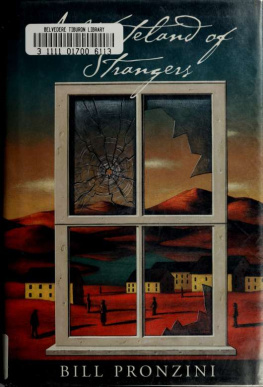
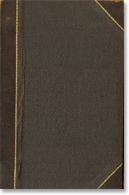



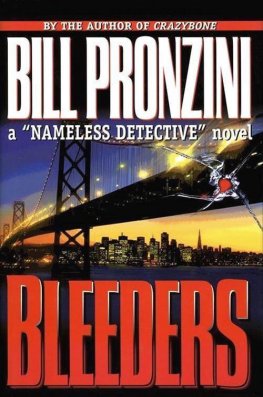
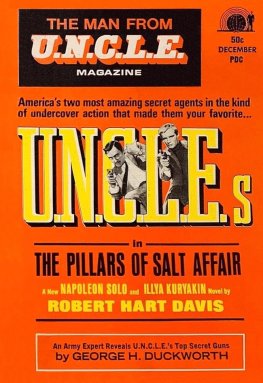
![Bill Pronzini - Sleuths [short story collection]](/uploads/posts/book/922610/thumbs/bill-pronzini-sleuths-short-story-collection.jpg)
